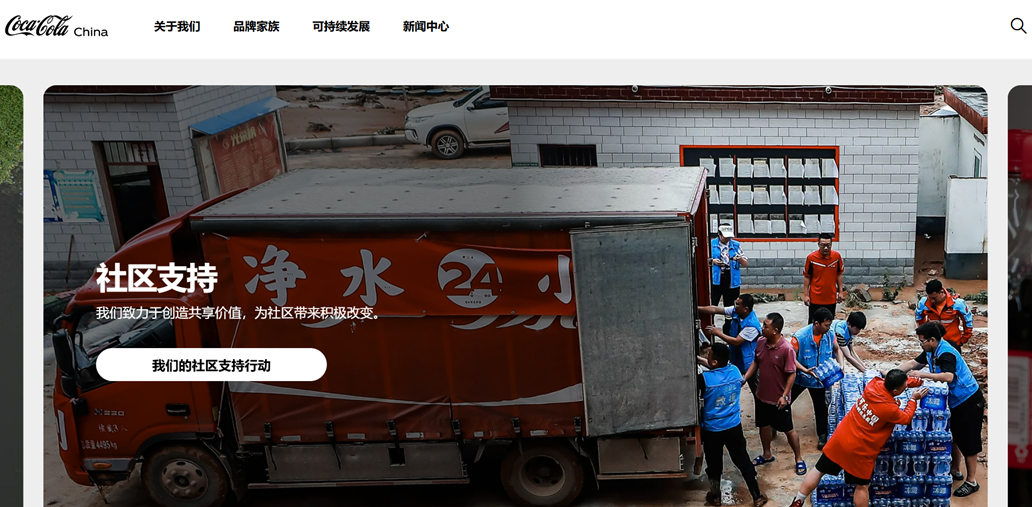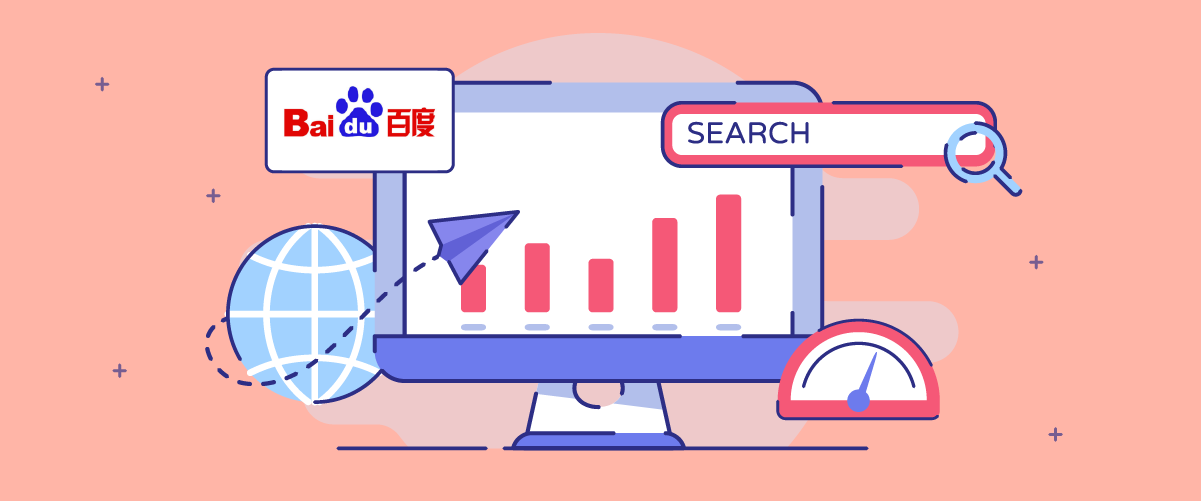Do you want to optimize your website on Baidu search engine? Baidu is one of the largest search engines used in China. As the largest search engine in China, Baidu dominates the market with complex search algorithms that are customized to local preferences. Therefore, it is very important to customize your SEO strategy specifically for Baidu. By focusing on Baidu SEO, you can tap into a highly targeted audience and maximize organic traffic from Chinese users.
This guide will help you understand how Baidu works, why Baidu is so important for your website’s SEO strategy in China, and the steps you can take to improve your Baidu ranking!
What is Baidu & how does it work?

Baidu is the largest search engine in China that emerged in 2000. It is like a Chinese version of “Google”. As of January 2024, Baidu search engine is still the king of search in the country with 61.11% of usage across device platforms.
Just like Google, Baidu is not just another search engine. They provide a variety of user-friendly services, from digital maps, video search, breaking news, to discussion forums. For advertisers, Baidu also provides a platform for digital advertising.
Interestingly, Baidu is specifically designed for the Chinese market by considering the customs and culture of the local people. If you have a business and want to succeed in the Chinese digital market and appear on the first page of Baidu then you need to optimize Baidu SEO.
To be able to appear on the top rankings of Baidu, a website must meet various requirements. Before that, why is Baidu SEO so important for your business? Let’s take a look at the review.
Important of Baidu SEO for your website

Here are some reasons why Baidu SEO is important for your website.
- Access to China’s digital market: China has a tremendous online user market. With this, it can open the gateway to 676 million active Baidu users every month. With such a large number, this platform allows businesses to reach your target market in China.
- Alternative to Google blocking: as we know, Google is inaccessible due to China’s internet policies. This leaves Baidu as a major player that is still unchallenged. For businesses that want to reach the Chinese market, there is no other choice – Baidu is the main path to reach digital consumers. So your business will be “visible” in the eyes of Chinese digital consumers.
- Localization and cultural appropriateness: It’s not enough to translate content into Chinese – businesses need to truly understand and adapt their content according to the preferences and habits of Chinese consumers. Therefore, SEO optimization on Baidu is able to encourage businesses to understand the Chinese market more deeply, from their search habits to their content preferences.
Difference between Baidu & Google SEO

Before discussing Baidu SEO tips one by one, it is important to know the fundamental differences with the Google search engine that many users use.
- Algorithm – Baidu’s algorithm is simpler and relies more on direct signals than Google. Baidu still relies heavily on traditional on-page SEO such as the right keywords and meta tags.
- Local SEO focus – Baidu highly prioritizes local Chinese content and gives higher rankings to websites that are truly aimed at the Chinese market.
- Webmaster tools – Baidu uses Baidu Webmaster Tools (Baidu Zhanzhang) while Google uses Google Search Console which both have their own features for SEO optimization.
- Backlink strategy – Baidu is stricter in evaluating backlinks and prioritizes backlinks from trusted Chinese websites. While Google has a more sophisticated backlink evaluation system.
To know more about the differences, you can visit the Baidu vs Google article for more details.
10+ Baidu SEO tips to get traffic to your website
After knowing the basic differences between Baidu and Google optimization, now it’s time for you to know what tips can be applied to Baidu SEO optimization. Here are some of them.
Get a Chinese domain (.cn) and host locally

To improve your Baidu ranking, it is highly recommended for foreign brands to have a Chinese website domain (.cn) and host the website in mainland China. This is because Baidu, as a local search engine, gives higher priority to websites hosted on servers in China.
If it is not possible to obtain a .cn domain and hosting in China, you can at least register a .cn domain and host in Hong Kong or South Korea for better speed. However, this will limit the scope of business operations that the website can do.
Having a .cn domain can help improve your website’s ranking on Baidu. Also, if you intend to use the website for commercial or sales purposes don’t forget to get a business ICP (Internet Content Provider) license which is now legally required.
Localize your website with Chinese nuances
When setting up a website for Baidu, ensure that the content and design are in line with Chinese culture, including the use of simplified Chinese characters, writing style, layout, and features familiar to users there. The use of simplified characters is highly recommended as Baidu favors this version although it also accepts traditional characters. This might be difficult if you’re not used to it, but there’s always a solution.
Avoid overly long or complex text, and use idioms, cultural references, and humor familiar to Chinese users to make it more relevant and understandable.
In the localization aspect of design, also pay attention to visual elements that appeal to their market, such as the use of colors and icons that are familiar in China.

By paying attention to the nuances of Chinese culture, you can create a more engaging experience for the Baidu audience, which can increase user engagement and support improved rankings on Baidu.
Regularly update relevant content for Chinese users
The next Baidu SEO tip is website posting frequency. Sites that are active, have a greater chance of getting a better position in local search results than sites that are updated inconsistently. However, you should also be careful with duplicate content as it can lower the content ranking.
In addition to publication frequency and content quality, complying with censorship regulations can also affect your Baidu ranking. As the Chinese government is very strict on sensitive matters, so make sure your content does not contain content that they do not allow.
Conduct keyword research and optimize meta description/tags
Next, do keyword research based on popular terms in Baidu SERPs and study the strategies of your industry competitors on this platform. Baidu SEO prioritizes the right keywords.
You can also utilize Baidu’s built-in tools, such as Baidu Index and Baidu Keyword Planner, to help with the keyword research process. Make sure that the keywords are added to the meta description, meta tags, keyword tags, title, ALT, and heading.
Provide multilingual website with a Chinese language
If you want to improve your ranking on Baidu, consider translating your content into Chinese. This allows your site to be more easily recognized by Baidu’s algorithm.
For example, the Tiffany & Co jewelry business website is well optimized on Baidu.

To make this process easier, you can also utilize Linguise automatic translation as it is capable of automatically translating web content into appropriate and natural Chinese with up to 97% accuracy. With this feature, you can provide high-quality translations without the need to manually translate each page.
Such high accuracy and precise localization can increase user engagement and have a positive impact on your site’s ranking on Baidu.
Use HTTPS
Compared to HTTP, Baidu’s SEO algorithm favors the HTTPS protocol for security reasons. So you need to purchase an SSL certificate from within China. Once purchased and applied, submit the new sitemap.xml to the Baidu search console. By using HTTPS, web content data can be transmitted securely via SSL.
Avoid JavaScript, iframes, or Flash content
Unlike other search engines, Baidu’s algorithm does not recognize interactive JavaScript applications or any flash content. Flash is deprecated here, but it is still necessary to pay attention to the use of JavaScript. If JavaScript is used to facilitate parts of the website that do not serve SEO purposes, then it is not a big deal.
In general, you can stick to simple HTML if you want to improve your search engine position.
Build high-quality internal and external links

Baidu often places websites with many relevant backlinks at the top of organic search results The content that Baidu prioritizes in search results generally includes backlinks from official sources such as newspapers or Chinese government websites. Therefore, try to get backlinks from websites with Chinese domains as well but still relevant and quality.
Also, don’t forget to include internal links that can direct your audience to other related web pages within the website. This structure can help Baidu to explore your content and increase your chances of moving up in the rankings.
Utilize Baidu webmaster tools and submit URLs
The next Baidu SEO tip is to use the webmaster tools they provide. When you have implemented a series of tips on content and the web, don’t forget to monitor analytics and performance using Baidu Webmaster Tools and Baidu Tongji.
Baidu Tongji (Analytics) is similar to Google Analytics, allowing you to analyze standard traffic flow, usage data, sources, and conversions. With some customization, data points for visitor analysis can include geographic location, device, education level, age, occupation, and interests.
This Baidu Webmaster tool also provides useful features for site testing.
Prioritize mobile optimization
China is a “Mobile First” country, with over 1.11 billion smartphone users in China and making smartphones one of their browsing tools.
Given the high penetration rate among Chinese internet users, mobile optimization becomes a ranking factor in Baidu. Mobile-friendly websites will rank much higher in desktop and mobile searches.
Improve speed and functionality
Slow sites are often considered low-quality by Baidu, making it reluctant to recommend them to users. Many global sites face performance issues in China due to infrastructure and code that is not compatible with the local internet ecosystem. Overcoming these issues requires more than just hosting in China or using a CDN alone.
Therefore, you need to improve site speed in other ways, such as optimizing image sizes, minimizing files, and using lazy loading techniques for visual elements that don’t need to load all at once.
Optimize your Baidu SEO for increased traffic!

Baidu SEO is an important strategy to increase your business exposure in the Chinese market. By understanding Baidu’s algorithm preferences and optimizing your website according to local needs, you can attract more traffic from Chinese users.
To speed up the localization process, you can use Linguise which is capable of auto-translating web content into Chinese. What are you waiting for? Sign up for your Linguise account and translate your website into Chinese to get your traffic from Chinese users!




